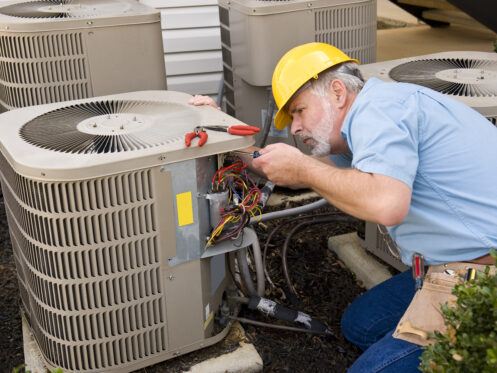Your HVAC system is essential for keeping indoor conditions comfortable. Given the hard work that your HVAC system puts in to keep your space livable, it is inevitable that this system may need repairs along the way. But at what point do repairs become impractical? Since no HVAC system lasts forever, it is important to remain aware of when it is time to replace it instead. A look at the top factors to consider can help you make the right choice for your household and family.
Age of HVAC System
According to the Department of Energy (DOE), the average life expectancy of an HVAC system is 15 to 20 years. HVAC systems that receive regular maintenance have a better chance of lasting their entire lifespans, but HVAC systems that do not receive maintenance can expect to lose up to 5% of effectiveness each year. If you are experiencing problems with your HVAC system but it is under 10 years old, reach out to a service technician who can make inspections and perform troubleshooting. If your HVAC system is over 15 years old, it is usually time to start reviewing replacement options instead.
Cost of Repairs
Another consideration is the potential cost of repairs. If you have a fairly new HVAC system, it is usually more cost effective to request repairs instead of buying new parts. Even if your HVAC system is moderately aged, it often makes sense to get a tune-up before ordering a full-fledged replacement of your system. If the cost of repairs begins to rival the cost of replacement, however, it is time to start considering a new system. The traditional method is to use the HVAC industry’s “5,000 rule.” Multiple the age of your HVAC system by the estimated repair cost. If the number exceeds $5,000, talk to your HVAC technician about a replacement instead.
Terms of Warranty
Many HVAC parts come with a manufacturer warranty. A warranty is a written assurance that outlines the terms by which a manufacturer will help repair or replace a part if something goes wrong. Most warranties have terms and conditions that require routine maintenance to keep the guarantee valid. Failure to keep up with regular maintenance or repairs can render the warranty null and void. In addition, warranties are also limited to specified time periods. If your warranty has expired and the cost of repair is high, it is often more practical to replace the parts instead.
Costs of Energy
According to the U.S. Office of Energy Efficiency & Renewable Energy, the average U.S. household pays 43% of its energy bills on heating and cooling costs. If your HVAC system is inefficient, the costs can climb even higher. HVAC units have a Seasonal Energy Efficiency Ratio (SEER) rating that measures energy efficiency. For examples, air conditioning units in the 1990s required a minimum SEER rating of 10. Starting in 2006, the minimum SEER rating was 13, and the minimum rose to 14 in 2015. Modern HVAC systems usually have SEER ratings over 20. For example, a variable speed or two-stage AC unit may have a SEER of up to 25. If you have an outdated system with a very low SEER rating, it is usually time to replace it. This is a worthwhile investment that can help you save on your annual utility bills.
Replacement Incentives
Some homeowners can benefit from local or federal tax credits for replacing their old systems with energy-efficient systems instead. For example, by reviewing the Environmental Protection Agency’s ENERGY STAR program on tax credits for homeowners, you can determine how you may qualify. You can also ask your HVAC technician about any state and local credits for upgrading your HVAC system. Other incentives include home value considerations. For instance, if you plan to sell your home in the near future, a newly upgraded system can make the property more appealing to buyers. Even if you plan to live in your home for a while longer, the peace of mind that comes with a new system and an extended warranty is often motivation enough to get a replacement.
Environmental or Safety Hazards
Replacing your HVAC unit is often non-negotiable if the problem involves environmental or safety concerns. For example, if an HVAC technician finds that your system is leaking carbon monoxide or poses a fire hazard, you may need to replace it immediately. In addition, some old HVAC units use outdated materials such as the R-22 refrigerant. Production of R-22 refrigerant ceased on January 1, 2020, due to the chemical’s tendency to deplete the ozone layer. This means that if your AC is leaking R-22, you will not be able to make any repairs with R-22 refrigerant refills, and you need to replace the unit instead.
Get Help From the Experts
Repairing or replacing your HVAC system requires input from the experts. E.P. Omega Air Conditioning LLC provides HVAC services to homes in El Paso and the surrounding areas. We offer AC repair, heating repair, and maintenance for all HVAC systems. Our technicians can also repair or replace ductwork as well as assess indoor air quality. No matter the heating or cooling project, we have you covered. Contact E.P. Omega Air Conditioning LLC today for all of your HVAC service needs.
Services We Offer include:
